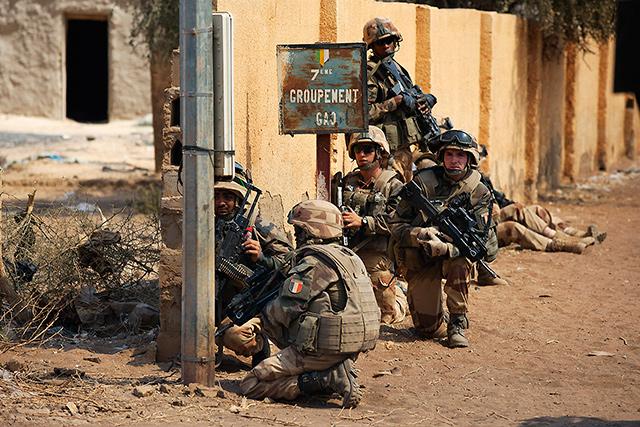
French troops regroup in Gao, Mali on Feb. 21, 2013 as they combat advances by Islamic militants. Violence in the region continues, with a car bombing in Kidal on Feb. 26; over 430,000 refugees have been displaced. Photo: Joe Penney/Reuters
Forces representing France and the government of Mali seem to have mostly regained control of the West African nation’s northern region following last month’s offensive, as I covered here. But the fallout from their pushback against rebellious elements continues.
I found two developments from a recent BBC update of particular interest. One concerns the status of refugees from the impacted areas, the other the makeup of the resistance and who the “enemy” really is.
The U.N. estimates that over 430,000 people have been displaced by the violence in Mali, and many have yet to return. Many feel the situation remains unsafe despite rebel retreats (in fear of reprisal by the government/army, chief among concerns). In the latest violent act that seems to justify those fears, on Tues. Feb. 26, 2013, a car bomb exploded in the town of Kidal, killing seven ethnic Tuaregs. The perpetrators are believed to be Islamic militants, ousted from controlling the town, though continuing raids and bombings.
Initially, I had interpreted that Tuaregs rebelled against Malian rulers — who gained power in a military coup in early 2012 — in league with Islamic militants. But it appears that rebel groups splintered shortly after their initial push for control of territory last spring, and Tuaregs turned around to support French intervention. The car bombing in Kidal, directed at a secular Tuareg group, is thought to derive from their change of heart.
Discord among Islamist groups is also coming to light. A letter has been discovered from Abdel Malek Droukdel, head of the north Africa-based al-Qaeda of the Islamic Maghreb, one of the groups with an imprint on the rebellion. The letter criticizes Mali militants for moving to implement Islamic law too rapidly, and correctly foretold France’s assistance.
I would say that the situation in Mali can hardly be called stable. Addressing the situation of refugees should be a very high priority, though no aspects of the recent actions in Mali appear will have easy resolutions.
You can’t spell Somalia without Mali. FPA blogger Tom Squitieri considers reactions to conflict in both countries.